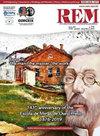克劳德·亨利·戈尔塞克斯:男人、老师和工作
Q3 Earth and Planetary Sciences
引用次数: 1
摘要
化学和物理电化学。安德罗•马尔罗曾经说过:“既然死人不可能复活,我们就让梦复活”,而大众智慧则补充道:“这是最美丽的教导,它可以与今天的年轻人和明天的男人联系起来”。在这里,其中一个梦想被重新实现。150年前的1842年10月19日,CLAUDE HENRI GORCEIX出生在Saint Denis des Murs(上维埃纳),一个只有四所房子的小村庄。他是Antoine GORCEIX和Valerie Cecile GORCEIX的儿子。当他快9岁的时候,他的父亲去世了,他的母亲带着她的七个孩子去了圣伦纳德。12岁时,他获得了利摩日学院的奖学金,在那里他以活跃的智慧和对工作的投入而闻名。他把自己的成功归功于他的教授们,直到生命的尽头,他都对他们保持着无可争议的记忆。在1860年获得文凭后,他的奖学金被转移到杜埃学院,在那里他学习了数学课程,为Éscole Normale(科学)做准备,并在巴黎的institui本文章由计算机程序翻译,如有差异,请以英文原文为准。
Claude Henri Gorceix: the man, teacher and work
Chemistry, and Physical-Electrochemistry. Once André Malraux said that “as it is impossible to resuscitate the dead, we resuscitate the dreams” and popular wisdom complements: “it is the most beautiful teaching that can be linked to the youth of today and the men of tomorrow”. Herein, one of these dreams is relived. It begins 150 years ago with the birth of CLAUDE HENRI GORCEIX in Saint Denis des Murs (Haute Vienne), a small village of only four houses, on October 19, 1842, son of Antoine Gorceix and Valerie Cecile Gorceix. When he was almost 9 years old, his father died and his mother, together with her seven children, went to live in Saint Leonard. At 12 years of age, he obtained a scholarship at the Liceu de Limoges, where he distinguished himself for his active intelligence and devotion to his work. He attributed his successes to his professors for whom he preserved an undisputable remembrance until the end of his life. After receiving his diploma in 1860, his scholarship was transferred to the Liceu de Douai, where a mathematics course prepared him for the Éscole Normale (sciences), the preparation of which was completed at the Instituição Massin in Paris. The following year, he entered the École Normale (Sciences). Here, he demonstrated a passion for Geology and Mineralogy, subjects in which he was said to be not only brilliant, but also very active, forecasting a career as a geologist. He finished the course in 1866 with a “Generalist in physical sciences and mathematics” diploma. Appointed Professor of Physics at the Liceu de Angoulême, he returned to Éscole as aggregated preparer of Geology and afterwards was sent to Athens as a science professor at the famous L’École française d’Anthènes.
求助全文
通过发布文献求助,成功后即可免费获取论文全文。
去求助
来源期刊

Rem-Revista Escola De Minas
工程技术-工程:土木
自引率
0.00%
发文量
0
审稿时长
6-12 weeks
期刊介绍:
REM – International Engineering Journal (antigua REM – Revista Escola de Minas) es la primera revista técnica de Sudamérica. Fue fundada en enero de 1936 por los estudiantes de la Escuela de Minas de Ouro Preto y desde entonces se ha especializado en la publicación de artículos en las áreas de la Ingeniería Civil, Geología, Metalurgia y Materiales y, Minería y Mecánica y Energía.
Su objetivo es servir como un medio de publicación para los trabajos técnicos y científicos originales de investigadores nacionales y extranjeros en esas áreas. Contribuciones originales (artículos y cartas) son aceptadas. Artículos de revisión dependen de la invitación y/o análisis de los Editores.
El envío de artículos para su publicación implica que el trabajo no ha sido publicado previamente, que no está siendo presentado para su publicación en otra revista y no se publicará en otro lugar, en la misma forma, sin el permiso, por escrito, de los Editores/Autores.
 求助内容:
求助内容: 应助结果提醒方式:
应助结果提醒方式:


